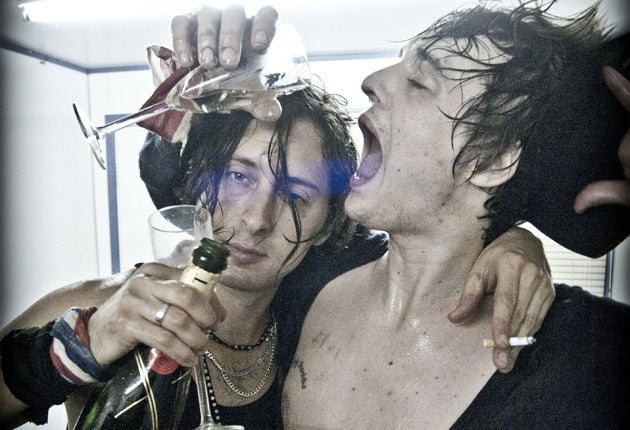Behind the scenes with The Libertines
A film about the indie rockers' riotous reunion paints a fresh picture of the band. Carl Barât tells Geoffrey Macnab about it

Carl Barât answers questions about his friend and former bandmate Pete Doherty with surprisingly good grace.
It's not as if he hasn't been asked them before. "It's something I have to live with," he states stoically. Later this month, Roger Sargent's film The Libertines – There Are No Innocent Bystanders, about the 2010 Reading Festival reunion of the band Barât and Doherty fronted, premieres at the East End Film Festival.
Drinking half a pint of shandy in the garden of an upmarket hotel near Old Street tube station, the 32-year-old Barât admits that he has only just seen the documentary himself. "It's quite a candid look at the characters involved, the relationships and that sort of dynamic," he reflects. "It's a lot more personal than anything that has ever been done before on the band."
The story of the friendship and songwriting partnership between Barât and Doherty is familiar enough. After being introduced by Doherty's sister at Brunel University in the late 1990s, they formed The Libertines and lived up gingerly to the stereotypes of self-destructive young British rock stars, writing some stirring music and being feted by the critics. Then Doherty's addictions and bad-boy behaviour kicked in. By 2004, after their second album, the band imploded – its full potential perhaps unfulfilled.
According to Barât, the film isn't some corny, magazine-style account of the band's rise and fall. "It definitely isn't that... it's more considered, more beautiful – and looks at things that are often overlooked." Like what? "Love's vicissitudes..." he suggests a little plaintively.
Doherty may have burgled his bandmate's apartment, forged his signature on cheques and missed practice but Barât's affection for him is evident. At a time when his fellow students were listening to dance compilations and taking ecstasy, Barât regarded Doherty as "the one person who saw the world in the antiquated and romantic way I did."
It is clear that Barât has reflected at length on his time as a Libertine. He has even written a book about it, Threepenny Memoir. "It didn't feel like an autobiography. It's not my life. I am not David Niven and I am not Jade Goody," he says of the book, published last year. "But at the time, I felt as if I was drowning in some Stygian fug of other people's negative and ghoulish accounts of what I was supposed to be."
Doherty is currently busy with his acting, playing the young hero in Sylvie Verheyde's Napoleonic-era film, Confession of a Child of the Century. Barât, who is midway through a solo music tour, also has acting ambitions. Last year, he appeared on stage at the Riverside Studios in Sam Shepard's Fool for Love opposite Sadie Frost. The critics weren't especially kind. One reviewer called him "the victim of his theatrical rawness" and accused him of "swallowing the ends of sentences." His own verdict is that he "just about got away with it." He is sanguine about the reviews. "The production was open to panning because of what we were taking on and who we were," he reflects.
As for his Libertine past, Barât freely acknowledges that, like Doherty, he embraced the cult of the self-destructive young artist a la Jim Morrison or Kurt Cobain. "I did embrace it, but when you're past 27, it's futile really."
Enjoy unlimited access to 100 million ad-free songs and podcasts with Amazon Music
Sign up now for a 30-day free trial
Enjoy unlimited access to 100 million ad-free songs and podcasts with Amazon Music
Sign up now for a 30-day free trial
Eventually, Barât (who recently became a father) decided that he couldn't "take any more drugs or stay up any more days or scream and bleed down the microphone to any more purpose. Obviously, I am not going to die. I am still here."
Twenty-seven is the age at which self-respecting rock stars are supposed to burn themselves out and die. "On the morning of your 28th birthday, you wake up and realise that you're not in that club and never will be... then a whole new dawn of possibility opens up beyond having died to inspire other miserable people."
The East End Film Festival will open on 27 April with the world premiere gala screening of the documentary 'The Libertines – There Are No Innocent Bystanders' ( www.eastendfilmfestival.com)
Join our commenting forum
Join thought-provoking conversations, follow other Independent readers and see their replies
Comments